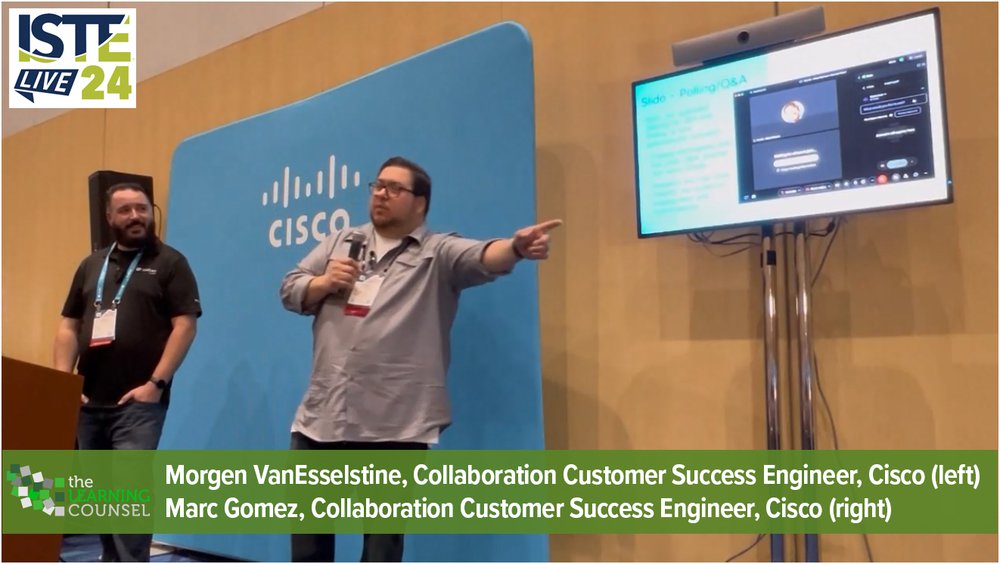At ISTELive 24, Mary Schlegelmilch, Lead K12 Business Strategy at Cisco, alongside Morgen VanEsselstine and Marc Gomez, both Collaboration Customer Success Engineers at Cisco, delivered insightful sessions on the role of AI in education. The session emphasized AI's transformative potential and practical applications within the educational sector.
Mary Schlegelmilch opened the session with enthusiasm, highlighting the significance of AI in education. "Today, we are so happy to be here because we are gonna talk about AI and education," she began. She directed the audience to a QR code linked to a wealth of AI resources. "It's a framework, a readiness index. It is a space where you can get some information on, well, if we're developing a policy about AI, what should we be considering in our district," she explained. Mary emphasized the importance of developing distinct AI policies for staff, faculty, and students, referencing Cisco's own stringent guidelines due to concerns such as PII (Personally Identifiable Information).
Mary also touched on Cisco's broader impact on education, stressing the company's foundational role in educational technology infrastructure. "We are so important that we're really that fourth utility. If the network goes down, many times your building automation system with your heating, air conditioning won't work as well," she said, underlining the critical integration of network technology in modern educational environments.
Marc Gomez took the stage next to discuss the integration of AI within Cisco's WebEx platform. "WebEx collaboration with AI for teaching and learning is not magic. It's here today. It's already in our platform," he stated. Marc elaborated on the comprehensive capabilities of WebEx, including calling, messaging, meetings, whiteboarding, webinars, events, polling, and video. He emphasized that WebEx’s AI models prioritize security and privacy, ensuring that content remains confidential and is not used for AI training.
Marc highlighted the inclusive and accessible nature of WebEx, which aims to create an equitable educational environment. "WebEx and the Cisco AI assistant helps power a more inclusive and accessible future for both teachers and students," he said. He shared real-world examples of how WebEx has been used to enhance student inclusion and accessibility, providing powerful tools to help students access educational content.
Morgen VanEsselstine provided a live demonstration of the AI assistant features within WebEx. "We're gonna talk about the AI assistant in and out of sessions, AI-generated session summaries," he explained. He demonstrated how the AI assistant can summarize sessions, allowing users to catch up on missed content. "You could hit, summarize, catch me up, and we'll actually go through and catch you up on the last 15 minutes or the last hour, however much you need," Morgen detailed.
Another feature he showcased was the "was my name mentioned" function, which alerts users if their name was mentioned during a session and provides the context. Additionally, the "what are the action items" feature helps users keep track of tasks and responsibilities discussed in meetings, ensuring they don't miss important details. "This is really helpful, especially in those project settings, in a classroom where you could have those action items laid out for each person," Morgen said.
The ISTELive 24 sessions led by Mary Schlegelmilch, Morgen VanEsselstine, and Marc Gomez from Cisco highlighted the pivotal role of AI in shaping the future of education. Cisco's comprehensive approach to integrating AI into its WebEx platform demonstrates the potential for technology to create more inclusive, efficient, and effective educational environments. By prioritizing security, manageability, and sustainability, Cisco is helping educators harness the power of AI to enhance teaching and learning experiences across diverse educational settings.
Tune in to one of the sessions below.











